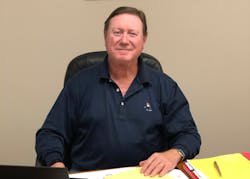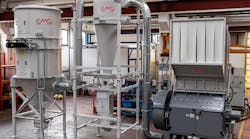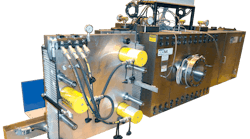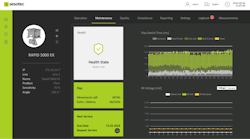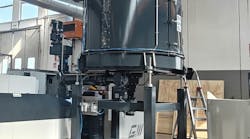Alexander (Sandy) Guthrie grew up in a family business that was a pioneer in plastics extrusion. His father founded Sterling Extruder Corp. in 1959 and Guthrie worked summers there and joined the business full-time in 1978, starting in the laboratory and stockroom and eventually working his way up to VP of sales.
After selling Sterling Extruder, Guthrie, along with his father and uncle, founded Merritt Extruder Corp., which they merged with another family business called Davis Electric, to form Merritt Davis Corp. That company, which Guthrie ran, was known for building technically innovative machinery for recycling, wire and cable, fiber optics, compounding and profile and tubing. In the 16 years of operation, Merritt had created a market where it was well-known for cutting-edge technology at a good price. The company pushed the envelope on reclaim and wire and cable technology.
Today he is president of ADG Solutions, a company that represents various machinery suppliers and provides performance-based know-how for the application, specification and supply of equipment systems for recycling plastic scrap into high-value raw material.
Guthrie is a long-time member of SPI -- The Society of the Plastics Industry, now known as the Plastics Industry Association -- where he has held many important positions and, in 2015, was inducted into the Plastics Pioneers Association. He has been a vigorous supporter of the NPE trade show and a member of the NPE committee since 1997.
Guthrie talked about his career and ADG Solutions in an interview with PMM editor Ron Shinn.
How did you start your business career?
Guthrie: My first job out of college was selling Florida real estate door-to-door in Boston. The properties had formerly been in and around swamps. It was a tough job. Next I moved to a company called Tech HiFi, which sold audio equipment, and became a store manager and eventually group manager for stores in New Jersey, Pennsylvania and New York.
When did you get into the plastics industry?
Guthrie: I started at Sterling Extruder in 1978 in the laboratory and stock room. My father’s big philosophy was that you had to know what you were working with. He had me in those jobs for a year and a half. Then he moved me into sales administration and eventually I climbed up to be VP of sales.
What happened next?
Guthrie: My father sold Sterling Extruder to Baker Perkins North America Inc. in 1986 and I stayed with Baker Perkins as VP of sales until 1989. My father also owned Davis Electric, which manufactured machinery for wire cable and fiber optic cables. I went to work at Davis Electric as the GM. In 1991, when Sterling Extruder was being sold to Davis-Standard LLC, some of the Sterling people approached us to start another extruder company. We did, and that was the beginning of Merritt Extruder Corp. A few years later we merged Merritt and Davis Electric to form Merritt Davis Corp.
What was your position with Merritt Davis?
Guthrie: I was the president and I sold it to Davis-Standard in 2005. I stayed with Davis-Standard for five years as their business director.
Describe the start of ADG Solutions.
Guthrie: In 2004, ADG Solutions was a little side consulting service. Merritt Extruder was alive and well. When I left Davis-Standard in 2010, ADG Solutions started to grow and get more into representation, distribution and sales of engineering of recycled systems.
What is the role of ADG Solutions?
Guthrie: We focus on recycling, from scrap to pellet. We help people with everything, starting with how to manage the incoming scrap, then through size reduction, sorting, washing, pelletization and handling afterwards with different pellet-handling systems. We work with people’s existing equipment to make it more efficient or we can put together an entire plant on a greenfield site. A lot of that involves our engineering abilities.
Why did you move into recycling instead of staying with extrusion equipment?
Guthrie: The focus started to change in the early 2000s. In the 1990s, there was a fair amount of recycling equipment being sold but it was primarily for post-industrial material and very little for post-consumer material. The equipment had not matured to a point where it was less than an art to get into that industry.
That remained true until the mid-2000s where some of the streams other than post-industrial material started to come into play. Those materials would mostly be blended and used as supplements. Very few people were using 100 percent post-consumer recycled material and those that were producing it were really blazing trails in terms of what would later become a pretty standard material.
It wasn’t until around 2012 or 2013 that post-consumer material started to really show up to the point that recyclers started to look at wash lines, sorting machines and everything needed to make a pellet that could be resold as a profitable product.
Was there an “aha moment” when you realized you could build a business selling recycling systems?
Guthrie: That business was always there in the background. There weren’t a lot of us involved in it. It actually had a pretty good root structure for me all the way through my career. It has been a good niche market, whether it was Sterling, Merritt or ADG.
The extrusion equipment side of the business has really adapted to being able to take multiple materials using one screw. It has been able to deal with varying densities and process them at higher rates. The sophistication in recycling has come through extrusion, through faster speeds, size reduction, most especially screw design.
Can ADG Solutions provide an entire recycling system with the companies it represents?
Guthrie: Absolutely. That’s why we say scrap to pellet. Whether it is post-consumer, post-industrial or post-commercial, we have different systems to help each customer figure out how to work within their niche process. They are all companies that specialize in their fields and not people just dipping their toes into recycling to test the waters. They have all made significant contributions in their areas.
Tell us about the CFO melt-filtration system you manufacture in-house.
Guthrie: ADG Solutions has built controls and various items needed for integration, but the CFO melt-filtration system is our first standalone product. Sales have met expectations.
The self-cleaning design is good for heavy contamination. We concentrate more on the recycling side than the compounding side of the process. Our machines are made for the guys who are dealing with tough materials and know that the compounder will be the final cleanup.
It operates at 3,500 psi and uses filtration screens up to 80mm mesh. We deal with coarse filtration.
Has China’s National Sword policy affected your business?
Guthrie: Much of the contaminated material our customers previously sent to China is now being processed here to add value. That plays into our equipment.
Have machinery manufacturers done enough to develop better recycling technology?
Guthrie: They have done a good job in getting us to this point. The next stage is being able to tackle some of the materials that are much more difficult to process. Systems to address this have started to come out in the last year or year and a half. This includes waste-to-energy systems and chemical recycling systems. You can see that the industry is continuing to advance with solutions on these problem materials.
Can more of the recycling process be automated?
Guthrie: Absolutely. With some materials, recycling is a little bit like Cracker Jacks — there’s a surprise in every box, so you have to always be on guard. An operator cannot put automation equipment in from Day 1. He has to really understand what’s coming into the plant before he can attack it with automation. There are a lot of ways to open a bale and get it onto a conveyor that has different speeds so the material can be better separated. And the source of the bales may change.
There is still a large avenue for automation to come into the recycling industry. We are right now at a bit of a turning point. Some of the scrap can now be sorted all the way down to PET, polyethylenes and polypropylenes and PVC. Sophisticated sorting and identification equipment is just now coming into its own.
If you were starting over today with ADG Solutions, would you follow the same course?
Guthrie: I would probably do a few things differently, but I think my path would be the same. I would not have chosen a different industry or different products. I like what I do. I have been doing it a long time and I can actually say I love coming to work. I like working with my customers. I like working with the products. I like figuring out the problems. It is something that has always appealed to me.
Is this a good time for a young engineer to get into plastics and the recycling business?
Guthrie: Yes. Having a fresh set of eyes and an open mind coming in now is valuable as we are starting to attack a much broader spectrum of plastics. There are so many materials and so many processes for a young engineer to come in and cut his own path in terms of things that interest him.
I think for the young people, the word plastics connotates something that is evil and not ecologically friendly. It has gotten a very bad rap. What plastics needs to do now is show people we are not an environmental enemy. We are someone who can actually help the planet and help people.
How would you like to be remembered?
Guthrie: I am very proud of what I have done in terms of promoting recycling, helping promote the technologies of plastics and helping this industry. I have been involved in the industry for more than 40 years and I think I’ve made a good contribution, both in machinery and promotion.
Just the facts
WHO IS HE: Sandy Guthrie, president of ADG Solutions
LOCATION: Tucker, Ga.
EMPLOYEES: 5
COLLEGE: University of Denver, BA in economics
WEBSITE: www.adgs.net
